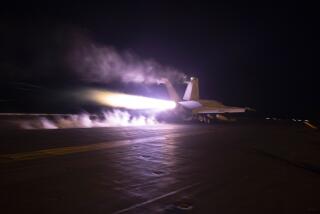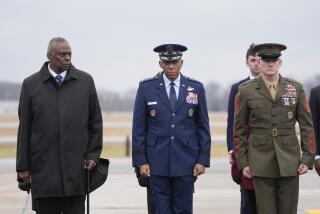Yemen president’s ouster may deal U.S. huge setbacks
Al Qaeda fighters, mercurial rebels and well-armed secessionists slip through the dangerous deserts and mountains of Yemen, which for years has been held together by President Ali Abdullah Saleh, a cunning tribesman with a dagger-gleam smile and a knack for outwitting his enemies.
But Saleh’s grip on this volatile Arabian Peninsula nation is unraveling after weeks of bloodshed and street protests that have led to the defection of five top army commanders and dozens of government officials. He has become a defiant, almost theatrical presence, offering unaccepted compromises in sound bites from the presidential palace as the political ground around him narrows.
Yemen strategically borders the Red Sea, the Gulf of Aden and Saudi Arabia. If Saleh is overthrown, civil wars could erupt in both the north and south, the Saudis would be rattled and possibly intervene militarily, Iran would almost surely exploit the chaos and the U.S. would be dealt a major setback in containing Al Qaeda in the Arabian Peninsula, an entrenched terrorist affiliate.
The drought-prone, poverty-stricken country, with oil tankers skimming its coast and pirates plying its waters, has over the years been largely neglected by the rest of the world. But with Saleh’s government on the verge of collapse, Washington is focusing on the multiplying dangers that could turn the country into an ungovernable haven for militants and a proxy for struggles between regional powers.
Saleh, in his latest effort to calm the rage against him, indicated Tuesday that he would step down before his term ends in 2013. He rejected a similar proposal two weeks ago and it is unclear whether protesters and opposition members would accept the offer now, especially after government forces killed at least 50 demonstrators Friday.
“We accept no initiative, no deals and no negotiations with this man,” said Sultan Atwani, an opposition party leader who has joined a diverse legion of protesters, including tribesmen with machine guns in their cars and university students with painted faces. “There are only hours left for him. All these promises are desperate excuses.”
The U.S. and other Western powers are not particularly fond of Saleh, who has ruled with an authoritarian swagger for 32 years and allowed for no potential successors outside his corrupt inner circle. But like the recently toppled presidents of Egypt and Tunisia, he has been an ally, although at times a reluctant one, in battling Islamic militants and keeping a semblance of order at the turbulent intersection of the Middle East and the Horn of Africa.
Washington has urged him to respect peaceful protests but has not directly called for him to step aside. The U.S. has sent weapons, intelligence and hundreds of millions of dollars to Saleh to counter the Al Qaeda offshoot, which has claimed responsibility for unsuccessful attempts in 2009 and 2010 to bomb American airplanes.
CIA Director Leon E. Panetta told Congress last year that Yemen’s extremists were the “foremost concern” for U.S. intelligence agencies. They are under less pressure than their counterparts in Pakistan, who are regularly bombed by unmanned U.S. drones.
Defense Secretary Robert M. Gates said Tuesday that he is worried that prolonged political upheaval would distract Yemeni officials from counter-terrorism efforts: “Instability and diversion of attention from [Al Qaeda] are my primary source of concern.”
Some key figures have been killed or arrested but the organization, with several hundred fighters and redoubts scattered over rugged tribal lands, remains potent. It took years and intense American pressure to convince Saleh that Al Qaeda was a threat to his family and his power.
What is now most troubling to the U.S. and Saudi Arabia is Al Qaeda’s reach and ambition. In 2009, an Al Qaeda operative, with explosives hidden in his rectum, crossed Yemen’s border and almost assassinated a Saudi prince. The group has also aligned itself with Islamic militants in war-torn Somalia. Those African radicals carried out twin bombings in Uganda in 2010 that killed at least 76 people.
The Obama administration has placed a lieutenant in the group, Anwar Awlaki, on a targeted killings list. Authorities say the radical American-born Muslim cleric hiding in Yemen inspired the 2009 attack at Ft. Hood, Texas, in which Army Maj. Nidal Malik Hasan is charged with killing 13 people.
There is also concern about the religious passions of whoever succeeds Saleh. A leading candidate is Maj. Gen. Ali Mohsin Saleh Ahmar, the country’s most powerful military commander, who defected to the protesters Monday. He is sympathetic to radical political Islam and may embolden the country’s fundamentalist clerics.
Ahmar’s questionable “dealings with terrorists and extremists … would make his accession unwelcome to the U.S. and others in the international community,” states a 2005 U.S. diplomatic cable released recently by the WikiLeaks website.
Islamic militants are only part of Yemen’s problems. The secessionist movement in the south, driven by communists, socialists and opportunistic tribesmen, threatens to split the country in half. Since Yemen was stitched back together after the 1994 civil war, the south has sought to break from Saleh. Rebel fighters have their own flag emblazoned on their rifle stocks.
Some analysts suggest that, though still pointed, secessionist talk in the south has been less aggressive during the protests in the capital, Sana. The desires of rebels in both north and south have been temporarily sidelined by the central goal of forcing the president out.
“Once they achieve it, they are going to fight amongst themselves, but not necessarily in the form of a civil war,” said Murad Azzani, a professor at Sana University.
The atmosphere remains precarious in the north, where years of intermittent fighting between government troops and Houthi rebels have left hundreds dead, destroyed villages and forced more than 300,000 people from their homes. The rebels, who belong to a Shiite Muslim offshoot, have long complained of economic discrimination.
The struggle is not over religion, but Sunni Muslim-run Saudi Arabia has accused Shiite-controlled Iran of aiding the insurrection.
In 2009, Saudi ground forces and warplanes pounded Houthi positions after a cross-border raid killed a Saudi guard. The rebels accused the kingdom, which has provided billions of dollars in recent years to prop up Saleh, of aiding the Yemeni army against them.
The tenor in the Arabian Peninsula has changed dramatically since then. Democracy protests sweeping North Africa and the Middle East have agitated sectarian tensions between Sunnis and Shiites in Bahrain and, to a lesser extent, Saudi Arabia. Saudi troops rolled into Bahrain this month to help King Hamed ibn Isa Khalifa violently put down protests by the nation’s Shiite majority. The move was quickly condemned by Iran.
Times staff writers Garrett Therolf in Cairo and Ken Dilanian and Paul Richter in Washington, Amro Hassan of The Times’ Cairo bureau and a special correspondent in Sana contributed to this report.
More to Read
Start your day right
Sign up for Essential California for news, features and recommendations from the L.A. Times and beyond in your inbox six days a week.
You may occasionally receive promotional content from the Los Angeles Times.







